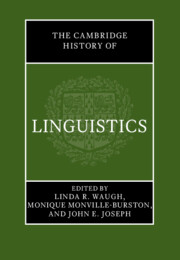Book contents
- The Cambridge History of Linguistics
- The Cambridge History of Linguistics
- Copyright page
- Dedication
- Contents
- Figures
- Tables
- Contributors
- Preface
- Acknowledgments
- Abbreviations, Acronyms, Special Symbols, and Other Conventions
- Introduction
- Part I Ancient, Classical, and Medieval Periods
- Introduction To Part I The Emergence of Linguistic Thinking within Premodern Cultural Practices
- 1 Ancient Near Eastern Linguistic Traditions: Mesopotamia, Egypt
- 2 East Asian Early Linguistic Traditions: China; Korea and Japan
- 3 History of Linguistic Analysis in the Sanskrit Tradition in Premodern India, with a Brief Discussion of Vernacular Grammars
- 4 Greek Linguistic Thought and its Roman Reception
- 5 Early to Late Medieval Europe
- 6 Near Eastern Linguistic Traditions
- 6A The Syriac Linguistic Tradition
- 6B The Hebrew Linguistic Tradition
- 6C The Arabic Linguistic Tradition
- Part II Renaissance to Late Nineteenth Century
- Part III Late Nineteenth-through Twentieth-Century Linguistics
- Part IIIA Late Nineteenth Century through the 1950s: Synchrony, Autonomy, and Structuralism
- Part IIIB 1960–2000: Formalism, Cognitivism, Language Use and Function, Interdisciplinarity
- References
- Index
6B - The Hebrew Linguistic Tradition
from Part I - Ancient, Classical, and Medieval Periods
Published online by Cambridge University Press: 20 July 2023
- The Cambridge History of Linguistics
- The Cambridge History of Linguistics
- Copyright page
- Dedication
- Contents
- Figures
- Tables
- Contributors
- Preface
- Acknowledgments
- Abbreviations, Acronyms, Special Symbols, and Other Conventions
- Introduction
- Part I Ancient, Classical, and Medieval Periods
- Introduction To Part I The Emergence of Linguistic Thinking within Premodern Cultural Practices
- 1 Ancient Near Eastern Linguistic Traditions: Mesopotamia, Egypt
- 2 East Asian Early Linguistic Traditions: China; Korea and Japan
- 3 History of Linguistic Analysis in the Sanskrit Tradition in Premodern India, with a Brief Discussion of Vernacular Grammars
- 4 Greek Linguistic Thought and its Roman Reception
- 5 Early to Late Medieval Europe
- 6 Near Eastern Linguistic Traditions
- 6A The Syriac Linguistic Tradition
- 6B The Hebrew Linguistic Tradition
- 6C The Arabic Linguistic Tradition
- Part II Renaissance to Late Nineteenth Century
- Part III Late Nineteenth-through Twentieth-Century Linguistics
- Part IIIA Late Nineteenth Century through the 1950s: Synchrony, Autonomy, and Structuralism
- Part IIIB 1960–2000: Formalism, Cognitivism, Language Use and Function, Interdisciplinarity
- References
- Index
Summary
In the sixth to ninth century the aim of linguistic studies was the preservation/transmission of the Hebrew Bible (Masorates’ glossaries). While the description of Hebrew began in Palestine and Babylon (Karaites and Rabbanites, tenth century), linguistic activity was the most productive in Al-Andalus (ninth-fifteenth century): dictionaries, restoration of Classical Hebrew, production of systematic grammars in Arabic (following the Arabic model). The multilingual situation led Hebrew grammarians to engage in comparative work on Semitic languages.
Keywords
- Type
- Chapter
- Information
- The Cambridge History of Linguistics , pp. 183 - 194Publisher: Cambridge University PressPrint publication year: 2023

